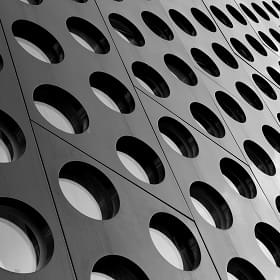Materials optimization in the offshore industry
The project is financed by the Danish Agency for Science and Innovation.
The Danish sector of the North Sea is facing considerable challenges with respect to oil and gas extraction. Significant investments in new technology must be taken in order to exploit oilfields that are less profitable than before. To obtain better profitability of marginal fields lighter installations are required, so that the total topside weight can be reduced. Well known lightweight materials such as aluminium and thermoset composites are expected to contribute to the weight reduction targets and in addition to this, considerable savings in maintenance can be achieved using these materials.
The use of these materials is, however, prevented through strict legislation and regulations, as well as the uncertainty and conservatism within the offshore industry, with respect to the use of light-weight materials.
The Danish producers of offshore wind turbines, who are also among the leading participants in the North Sea, are likewise facing great challenges in the use of the materials currently being used, as the wind turbines are subjected to twice the wear and tear compared with wind turbines situated on land. This is caused by the extreme offshore environment, as well as the high speeds that are generated to produce this energy at these locations. The Danish offshore wind sector holds a strong position in the global market, but in order to keep this position, the sector needs to be developed, so that the “Cost of Energy” is reduced. In this connection, the lightweight material technology can make a crucial difference.
DMN is working towards nurturing the use of these light-weight materials in the offshore industry.
The object is to promote the use of alternative materials in off-shore installations in cooperation with the lead participants in the North Sea. This includes equipment for the extraction of oil and gas as well as offshore wind turbines and the related equipment.
The goal is to nurture the interest of between 3 to 6 subcontractors in the use of these lightweight materials and thereby promoting their innovation and competence in product and process development.
A further goal is that this activity will form the basis for an application for more funding to launch a bigger development project in this area.
The activity has great societal relevance as it is estimated that approx. 70% of all technological innovations in the energy sector are related to materials usage.
To ensure that relevant issues in the sector are being addressed, in continuation of the offshore projects that the network has already completed, PlastNet are looking for relevant people for a project group. These would be people with professional qualifications in the field as well as people from companies that can provide specific technical issues that need to be explored.
In the project, there will be a special focus on involving subcontractors in the offshore industry as well as including relevant sparring partners with a view to dialogue about legislation and regulations in the area.
A technical issue needs to be chosen for further discussions and a case must be formulated and started up.
Materials need to be chosen for the chosen issue and relevant tests conducted. A prototype must be produced and the work documented.
DMN members can read publications about the project in Danish here >
 For further information, please contact:
For further information, please contact:

- Dorte Walzl Bælum
- Network Director
- B.Sc. Chem. Eng., M.Sc. in Business
- M: 60 35 19 90
- E: dwb@dmn-net.com


